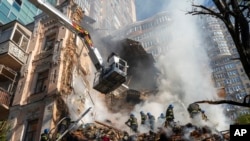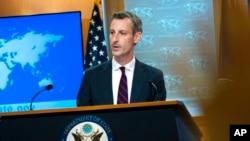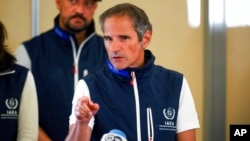Israeli President Isaac Herzog plans to share intelligence about Iranian drones being used by Russian forces in Ukraine when he meets Wednesday with U.S. President Joe Biden.
Herzog’s office said Israel has images showing similarities between drones shot down in Ukraine and those Iran tested in 2021.
Ukraine and its Western partners have said Russia’s recent use of drones to attack Ukrainian cities, including Kyiv, involves Iranian-made Shahed-136 drones.
Iran has denied supplying them to Russia and Russia has denied using them in Ukraine.
Biden on Tuesday issued a strong warning on Russia against using a dirty bomb or any other nuclear weapons in its war on Ukraine.
"Russia would be making an incredibly serious mistake for the use of tactical nuclear weapons,” he said Tuesday when a reporter asked whether Russia is setting up a “false flag operation” — preparing to deploy a “dirty bomb” as it accuses Ukraine of detonating it in its own territory.
“I'm not guaranteeing you that it's a false operation yet. I don't know. But it would be a serious, serious mistake," he said.
U.S. State Department spokesperson Ned Price said Tuesday there is reason for concern as Russia has “demonstrated a pattern of accusing others of that which it itself is ultimately planning." On Monday, Price warned of the “profound nature of consequences” should Moscow deploy such weapons.
Russia’s ambassador to the United Nations, Vasily Nebenzya, sent a letter, seen by VOA, to U.N. Secretary-General Antonio Guterres and the Security Council late Monday, saying Russia “will regard the use of the dirty bomb by the Kyiv regime as an act of nuclear terrorism.”
Ukraine has strongly denied Moscow’s allegations that it is planning to detonate a dirty bomb on its own territory and has in turn accused Russia of plotting to use the threat of a bomb laced with nuclear material as a pretext for escalation in Ukraine.
The U.N. Security Council discussed the allegations at a closed-door meeting Tuesday.
“We’ve seen and heard no new evidence in this private meeting,” Britain’s deputy U.N. ambassador, James Kariuki, told reporters. “The ministers of the UK, France and the U.S. have been clear: this is a transparently false allegation we are hearing from the Russian Federation. Ukraine has been clear; it has got nothing to hide; IAEA inspectors are on the way.”
Meanwhile, the head of Russia’s nuclear, biological and chemical protection troops, Lieutenant General Igor Kirillov, in a media briefing, said Russian forces are “preparing to work under radioactive contamination.”
International Atomic Energy Agency (IAEA) Director General Rafael Mariano Grossi confirmed that “no undeclared nuclear activities or material were found” in Ukrainian nuclear locations.
“The IAEA inspected one of these locations one month ago and all our findings were consistent with Ukraine’s safeguards declarations,” Grossi said.
Grossi confirmed that both locations are under IAEA safeguards and have been visited regularly by IAEA inspectors. He added that the IAEA received a written request from Ukraine Monday to send teams of inspectors to carry out verification activities at the two locations.
Russia has requested a second council meeting on Thursday to discuss its allegations that the United States and Ukraine have been conducting military biological activities on Ukrainian territory.
In a 310-page letter sent to the Security Council, president and the secretary-general, Russia’s ambassador rehashes old claims about the two states planning to infect migratory birds, bats and even mosquitos with lethal pathogens and then deploy them to infect Russian troops and/or civilians.
Ambassador Nebenzia includes a draft resolution for the council to consider forming a commission to investigate U.S. and Ukrainian compliance with the Biological Weapons Convention. The commission would be made up of the 15 council members and be expected to report back by November 30. Such a proposal is unlikely to gain traction among council members.
VOA’s U.N. Correspondent Margaret Besheer and White House Bureau Chief Patsy Widakuswara contributed to this article. Some information for this story came from The Associated Press, Agence France-Presse and Reuters.








